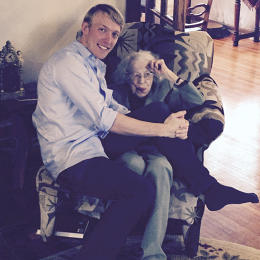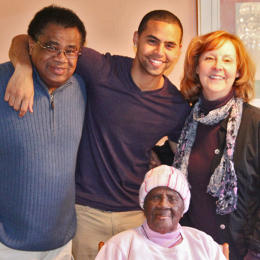THESE 3 ENTREPRENEURS STARTED COMPANIES TO HELP THEIR GRANDPARENTS
SILICON VALLEY ISN'T QUITE AS "YOUTH-CENTRIC" AS YOU MIGHT THINK.
By Christina Farr, December 2015
Kai Stinchcombe’s grandmother Ruth got swindled out of $40,000 of her savings through credit card scams.
Ruth, a retired schoolteacher who suffered from dementia, was preyed upon by telemarketers and salespeople in the last decade of her life. Stinchcombe inherited the job of calling up her grandmother's banks to try to retrieve some of the funds. After several years of this, Stinchcombe, a San Francisco-based serial entrepreneur, decided to set up a credit card company of his own, one geared toward senior citizens's needs, called True Link Financial.
 With the spirit of giving upon us, Fast Companycaught up with Stinchcombe and two other entrepreneurs who started companies to help their grandparents. These entrepreneurs are proving that Silicon Valley is starting to wake up to the needs of the aging population, rather than just helping millennials score dates or hail a cab.
With the spirit of giving upon us, Fast Companycaught up with Stinchcombe and two other entrepreneurs who started companies to help their grandparents. These entrepreneurs are proving that Silicon Valley is starting to wake up to the needs of the aging population, rather than just helping millennials score dates or hail a cab.
TACKLING FINANCIAL FRAUD
Stinchcombe's True Link Financial produces a debit card targeted at the elderly. It includes a variety of safety precautions, like letting caregivers put limits on spending at stores like QVC or Target. It also sends alerts to family members via SMS or email when suspicious or unusual spending occurs.
"My grandmother once wired thousands of dollars to someone posing as her sister, and donated to weird organizations that were sending her confusing letters," Stinchcombe recalls. AARP estimates that older adults lose some $3 billion each year due to this kind of financial fraud.
Stinchcombe's company recently raised $3.4 million from a group of investors that the company describes as "less youth-centric." With the funding, True Link is considering protecting other types of assets for older populations, such as credit scores.
ONLINE DATING
Marcie Rogo's entrepreneurial journey began when she was a kid. After both of her grandmothers were widowed, Rogo watched them become lonely and depressed. One of Rogo's grandmothers became isolated from many of her friends, who tended to socialize in groups with their partners. "That generation really is a couple's world, and so she felt like she had no one to do things with," Rogo says.
During business school, Rogo interned at an assisted living facility. She noticed that many of the residents struggled to connect with each other, but spent a lot of time playing games on their iPads. Rogo came up with an idea to make it easier for them to connect: Stitch, a companionship site for people over 50.
Rogo says about half of the site's users are uncomfortable with the idea of online dating. That's why she designed the site to focus on shared interests, whether it's watching movies, walking on the beach, or playing card games. Rogo's eldest grandmother is currently using Stitch to find companions for travel, dining out, and going to the movies. "My grandparents were a huge influence on this business, and really, my entire life," she says.
FINDING CAREGIVERS
For Kyle Hill, finding the right caregiver for his grandmother was an excruciating process. Hill is based in California, but his grandmother lived thousands of miles away in Seattle.
 Hill says his family remotely hired a series of people who lacked the skills to care for his grandmother, who suffers from Alzheimer's disease. Many of them showed up late, or left his grandmother to fend for herself for long stretches. On one occasion, she was alone for 16 hours before a neighbor checked up on her. "She was in a bad state," Hill says. "It was the first time I ever saw my dad cry."
Hill says his family remotely hired a series of people who lacked the skills to care for his grandmother, who suffers from Alzheimer's disease. Many of them showed up late, or left his grandmother to fend for herself for long stretches. On one occasion, she was alone for 16 hours before a neighbor checked up on her. "She was in a bad state," Hill says. "It was the first time I ever saw my dad cry."
It was the first time I ever saw my dad cry.
Hill, who has long been interested in technology, started to think about how the process could be improved. He started his company, HomeHero, to help families find high-quality caregivers online. Family members can use HomeHero to vet candidates, pay them using electronic methods, and set up a real-time broadcast of the caregiver once they are in the home.
Hill says it's more common than you might expect for founders to start companies to help their grandparents. "Starting a health care company of any kind isn't easy," he says. "A lot of us were inspired by a personal experience."




